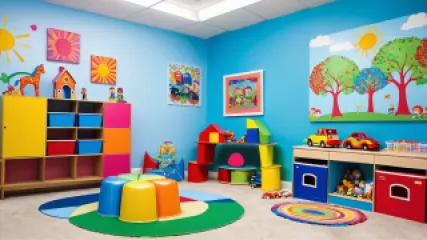Legeterapi
Introduction:
Play therapy is a powerful therapeutic approach that helps children express their feelings, improve communication skills, and develop emotional regulation. It provides a safe and supportive environment for children to explore and process their experiences, ultimately leading to positive behavioral changes. In this comprehensive guide, we will delve into effective play therapy techniques that can be used to address behavioral problems in children. Whether you are a parent, caregiver, or mental health professional, these techniques will equip you with valuable tools to support children in their emotional and behavioral development.
Section 1: Understanding Play Therapy
Play therapy is a form of therapy that utilizes play as a means of communication between the child and the therapist. It recognizes that play is a natural and essential part of childhood and provides a medium through which children can express themselves, make sense of their experiences, and develop coping strategies. Play therapy is particularly effective in addressing behavioral problems as it allows children to explore and work through their challenges in a non-threatening and enjoyable manner.
1.1 The Benefits of Play Therapy for Behavioral Problems
Play therapy offers numerous benefits for children experiencing behavioral problems. Through play, children can:
- Express emotions: Play therapy provides a safe space for children to express and communicate their emotions, even if they may not have the language skills to do so verbally. They can use toys, art materials, and other props to represent their feelings and experiences.
- Develop problem-solving skills: By engaging in play, children can practice problem-solving skills and explore different solutions to challenging situations. Through imaginative play, they can learn to navigate real-life scenarios and develop adaptive behaviors.
- Enhance emotional regulation: Play therapy allows children to learn and practice emotional regulation skills. As they engage in play, they can experiment with different emotional responses and learn how to manage their feelings effectively.
- Improve social skills: Play therapy promotes social interaction and offers opportunities for children to develop and practice social skills such as sharing, taking turns, and cooperation. They can learn to navigate social dynamics and build positive relationships.
1.2 The Role of the Play Therapist
A play therapist is a trained professional who specializes in working with children using play therapy techniques. They create a safe and supportive environment where children can freely express themselves through play. The play therapist observes and interacts with the child, gaining insights into their emotions, thoughts, and behaviors. They use various play therapy techniques to guide the child towards positive change and growth.
Section 2: Play Therapy Techniques for Behavioral Problems
2.1 Therapeutic Play Materials
In play therapy, the choice of therapeutic play materials is crucial. The therapist carefully selects toys, art supplies, and other props that allow the child to express themselves effectively. Common play materials used in play therapy include:
- Dolls and action figures: These can represent family members, friends, or significant others in the child's life. Children may use them to act out scenarios, express relationships, or explore emotions.
- Art supplies: Drawing, painting, and sculpting materials provide children with a creative outlet for self-expression. They can depict their experiences, emotions, and aspirations through their artwork.
- Sand tray and miniature figures: The sand tray allows children to create scenes using miniature figures and objects. This technique, known as sandplay therapy, provides a symbolic representation of their inner world and facilitates emotional processing.
2.2 Non-Directive Play Therapy
Non-directive play therapy, also known as child-centered play therapy, allows the child to take the lead during the therapeutic session. The therapist creates a safe and accepting environment where the child feels empowered to explore and express themselves freely. The therapist actively listens, reflects the child's feelings, and validates their experiences without judgment or interpretation. This approach encourages the child's self-discovery and fosters a sense of autonomy and control.
2.3 Directive Play Therapy
Directive play therapy involves the therapist taking a more active role in guiding the play session. The therapist may introduce specific themes, activities, or interventions to address the child's behavioral problems directly. This approach provides structure and guidance while still allowing the child to express themselves through play. Directive play therapy techniques may include:
- Role-playing: The therapist and child may engage in role-playing activities to explore and practice appropriate behaviors in real-life situations. This technique can help the child develop problem-solving skills and improve social interactions.
- Storytelling: The therapist may use storytelling as a way to address specific behavioral issues. Through fictional characters and narratives, the child can gain insights into their own behavior and learn alternative ways of responding to challenges.
Section 3: Implementing Play Therapy Techniques
3.1 Creating a Play-Friendly Environment
When implementing play therapy techniques at home or in a therapeutic setting, it is essential to create an environment that supports play and emotional expression. Consider the following tips:
- Provide a dedicated play area: Designate a specific space for play therapy activities. This could be a room or a corner of a room where the child feels safe and comfortable.
- Organize play materials: Keep play materials easily accessible and organized. Sort toys, art supplies, and other props in labeled bins or shelves, allowing the child to choose what they want to use during a play session.
- Minimize distractions: Ensure the play area is free from distractions such as excessive noise, clutter, or interruptions. Create a calm and focused environment that promotes engagement and concentration.
3.2 Building Rapport and Trust
Establishing a strong rapport and trust with the child is crucial for the success of play therapy. Here are some strategies to build a positive therapeutic relationship:
- Active listening: Give the child your undivided attention during play sessions. Listen attentively to their words, emotions, and non-verbal cues. Reflect back their feelings to show understanding and validation.
- Empathy and acceptance: Create a non-judgmental and accepting atmosphere where the child feels safe to express themselves authentically. Show empathy towards their experiences and emotions, fostering a sense of trust and connection.
- Respect boundaries: Recognize and respect the child's boundaries and limitations. Allow them to set the pace and level of engagement during play therapy sessions.
Section 4: Case Studies
To illustrate the effectiveness of play therapy techniques in addressing behavioral problems, let's explore two case studies:
Case Study 1: Jacob Reyes
Jacob, a 7-year-old boy, exhibits aggressive behaviors both at home and school. Through non-directive play therapy, the therapist creates a safe space for Jacob to express his anger and frustration. Over time, Jacob learns healthier ways to cope with his emotions and develops empathy towards others.
Case Study 2: Layla Young
Layla, a 5-year-old girl, struggles with anxiety and social withdrawal. The play therapist uses directive play therapy techniques, such as role-playing and storytelling, to help Layla build confidence and improve her social skills. Through play, Layla gains a sense of empowerment and begins to engage more comfortably with her peers.
Conclusion:
Play therapy offers a valuable approach to address behavioral problems in children. By harnessing the power of play, children can explore their emotions, develop problem-solving skills, and enhance their social interactions. Whether you are a parent or a mental health professional, incorporating these effective play therapy techniques can support children in their emotional and behavioral development, ultimately leading to positive and lasting change.














